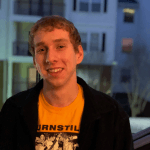This is an insight written by Jack Schurman on the recent Bahá’í Chair for World Peace conference on Infrastructure and Happiness, co-sponsored with United World Infrastructure and the College of Behavioral and Social Science on April 4-5, 2019
As Dr. Ryff talked about the six components of wellbeing and the eudaimonic approach to happiness, I couldn’t resist gauging how well I believe I am doing in each area. I connected her brief discussion regarding the distinction between eudaimonia and joy to cognitive science articles I have read related to resilience and the concept of the hedonic treadmill. The results indicate an ability for human happiness to constantly return to roughly the same level even after major positive or negative events, hence why there are more factors in life satisfaction and wellbeing than just happiness.
In regards to the components that she discussed, the ones that aroused the greatest thought for me were personal growth and purpose in life. As a young adult about half way through college, I feel as if only in the past few years have I started to solidify who I am as a person. It’s both scary and inspiring to think about all the possible directions my life could head in in the next few years, and I am still unsure about what exactly I want to do or who I want to become. For that reason, this talk seemed important to me, and I am thankful for the ways in which her discussion has helped me delve deeper into these thoughts.
As many opportunities as I have myself, Dr. Ryff’s talk reminded me of how worrisome it can be to think about how many people have more opportunities than I do, and likewise how many people have fewer opportunities, based solely on the position in life they were born into. Her discussion regarding inequality and greed made me think deeper regarding how, if at all, we could try and fix these issues from a political viewpoint without compromising moral values or western ideals such as liberty that appear so deeply entrenched in our society.
The Sackler family example in particular reminded me of the concept of distributive justice in political philosophy. The points she raised regarding how philanthropy work from the rich should not always be celebrated, and her explanation of how art museums started to outright refuse donations from the Sackler’s indicated to me that it seems significant to consider the way in which someone came about their money, even when it is being used towards what would otherwise be considered a good end.
However, other parts of her talk seemed to appeal to another common intuition regarding wealth distribution, being that greed and inequality should also be avoided. The questions then appear to include to what degree would a just distribution seek to avoid these things, how should society ensure the distribution is followed, as well as whether or not one of the two identified common intuitions should supersede the other (for example, is some inequality fine if the richer people came about their money in a just way?).
Another area of the talk that I found thought provoking was the discussion regarding how the arts and humanities can foster eudaimonia. Even as someone who tries to read a lot, and discusses a lot of philosophy, I still feel as though I do not explore the rest of the arts and humanities as well as I should. A lot of the school work I do is focused on critical thinking, and almost all the things I read are focused on conveying knowledge. Her discussion about the benefits that the arts and humanities can provide has helped convince me to perhaps pick up the Robert Frost collection that’s been sitting on my shelf for half a year the next time I’m reading for pleasure. Despite the fact that I consider music to have had a tremendous impact on my life, and I have been wanting to learn how to play a new instrument, I still have not played any music since sophomore year of high school. After listening to the talk, for the sake of my own eudaimonia, I think that I am going to make it a bigger priority to change that.
About the Author:
Jack Schurman is a Sophomore from Columbia, MD studying computer science and philosophy. On campus, you can find him with the Philosophy Club or out skateboarding. He is not sure what he wants to do after school, but he is leaning towards doing something with research.

